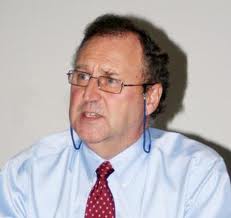Prominent businessman and Queen’s Counsel Clive Stanbrook is spearheading a team of businesspersons from the Turks and Caicos Islands who are sending a “clear warning” to Britain’s Finance Minister George Osborne that the imposition of a Valued Added Tax (VAT) would be inappropriate and undesirable in this British Overseas Territory.
In a press statement issued from London on behalf of the newly-formed Turks and Caicos Independent Business Council (TCIBC), Stanbrook, who is the group’s chairman, stated: “We are sending a clear message to the British Government. It is the view of virtually the entire business community in the Turks and Caicos that a VAT tax is inappropriate, costly, cumbersome and unnecessary at this stage in the development of these Islands. In the short term it is clear that the existing taxation systems can be relied upon to raise such extra revenue as may be needed. ”
The press release said that the British Government “has a major battle on its hands over the proposed implementation of VAT in The Turks and Caicos islands”, following the formation of TCIBC by a broad group of concerned individuals from all sectors of the economy and business community throughout the TCI.
Stanbrook, is the owner of IGA Graceway, the largest supermarket chain in the Turks and Caicos Islands, and a former partner in the prestigious law firms Misick and Stanbrook. An anti-VAT online petition, (www.ipetitions.com/petition/just-say-no-to-vat) was started on May 29, 2012. Its first signatory was a Fleur Stanbrook, the name of one of Stanbrook’s daughters.
Meantime, the press release quoted a TCIBC spokesman as saying: “We have a common purpose in that we are all unified in our opposition to the introduction of VAT in the Turks and Caicos Islands. We send a clear warning to Chancellor George Osborne that we represent the interests of all the leading businesses in the country and indeed it can be said that our views are representative of virtually every business concern. We are deeply concerned about the expected negative effects of the hasty introduction of VAT into the island’s tax structure. As business professionals we do not have a problem with taxation and recognize the need to fund government.”
The TCIBC said it has a major problem with this particular type of tax and its inappropriate nature for the Turks and Caicos Islands and its unique economy at this time and at this specific point in its young development.
“We believe that the recent gains in economic sustainability will be lost with the imposition of this “boiler plate”, cookie cutter, tax system,” the TCIBC added. “This new VAT tax is not driven by a “grass roots” initiative, but is a politically driven tax imposed upon us by distant bureaucrats based in Europe without effective due process and regard to our specific economy and its future development. One size does not fit all. It is our intention to continue the debate on VAT through wider public education and dissemination of information and to oppose and resist its introduction through whatever legal mechanisms are open to us. This will include public consultations and education through the press, TV and radio.”
The TCIBC noted that this task has already begun with over 3000 people having already signed an on-line petition opposing VAT, adding that many more are joining us daily.
“This is not a done deal as many think. No government or administration can impose any policy upon a community if that community refuses to accept the policy,” the TCIB added.
Discussion on the implementation of Value Added Tax (VAT) in the Turks and Caicos Islands has reached the House of Commons in England.
On June 18th, MP Andrew Rosindell asked the Secretary of State for Foreign and Commonwealth Affairs what is his policy on the introduction of VAT in the Turks and Caicos Islands; and if he will make a statement.
Mr Henry Bellingham, who was recently in the Turks and Caicos Islands to announce that elections will be on November 9th, 2012, replied: “The introduction of VAT is a decision for the Turks and Caicos Islands Government. Their decision was based on thorough research and an assessment that VAT would offer a simpler, equitable and stable revenue source. A decision to introduce VAT was announced in the 2011-12 budget statement. A Green Paper on VAT implementation was published in May and consultation is under way on this.”
Chief Financial Officer Hugh McGarel-Groves in response to a local anti-VAT campaign, said last week that introducing VAT in the Turks and Caicos Islands offers the opportunity to further strengthen the country’s fragile recovery by introducing a simpler, equitable and stable source of Government revenue.
He said: “As the community of the TCI continues to discuss the implementation of VAT, critical questions must continue to be asked of both of the Government but also of the anti-VAT campaigners: what are their alternatives to the benefits of VAT to a renewed TCI; is opposition to VAT borne from a desire to continue not to pay tax at all in some business sectors?
“Given the difficulties endured by the TCI economy since the collapse of the last Government, it is in the best interests of the entire community to ensure that Government finances are secure and that it can continue to develop expenditure plans in line with local peoples’ priorities – a process already begun in this year’s Budget. VAT is a proven system across the Caribbean. It is straightforward to administer and is beneficial here in that this single form of taxation replaces five different sets of ordinances that both Government and business need to keep abreast of.”

